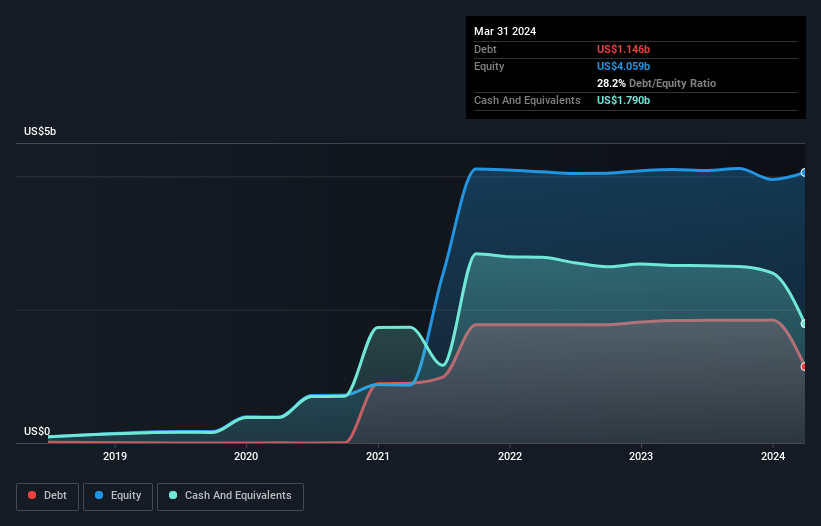- United States
- /
- Software
- /
- NYSE:BILL
BILL Holdings (NYSE:BILL) Has Debt But No Earnings; Should You Worry?

Legendary fund manager Li Lu (who Charlie Munger backed) once said, 'The biggest investment risk is not the volatility of prices, but whether you will suffer a permanent loss of capital.' It's only natural to consider a company's balance sheet when you examine how risky it is, since debt is often involved when a business collapses. We note that BILL Holdings, Inc. (NYSE:BILL) does have debt on its balance sheet. But the more important question is: how much risk is that debt creating?
What Risk Does Debt Bring?
Debt assists a business until the business has trouble paying it off, either with new capital or with free cash flow. Ultimately, if the company can't fulfill its legal obligations to repay debt, shareholders could walk away with nothing. While that is not too common, we often do see indebted companies permanently diluting shareholders because lenders force them to raise capital at a distressed price. Of course, plenty of companies use debt to fund growth, without any negative consequences. When we think about a company's use of debt, we first look at cash and debt together.
Check out our latest analysis for BILL Holdings
How Much Debt Does BILL Holdings Carry?
As you can see below, BILL Holdings had US$1.15b of debt at March 2024, down from US$1.84b a year prior. But on the other hand it also has US$1.79b in cash, leading to a US$643.4m net cash position.

A Look At BILL Holdings' Liabilities
Zooming in on the latest balance sheet data, we can see that BILL Holdings had liabilities of US$3.83b due within 12 months and liabilities of US$1.24b due beyond that. Offsetting these obligations, it had cash of US$1.79b as well as receivables valued at US$679.5m due within 12 months. So its liabilities total US$2.59b more than the combination of its cash and short-term receivables.
This deficit isn't so bad because BILL Holdings is worth US$6.29b, and thus could probably raise enough capital to shore up its balance sheet, if the need arose. However, it is still worthwhile taking a close look at its ability to pay off debt. Despite its noteworthy liabilities, BILL Holdings boasts net cash, so it's fair to say it does not have a heavy debt load! When analysing debt levels, the balance sheet is the obvious place to start. But ultimately the future profitability of the business will decide if BILL Holdings can strengthen its balance sheet over time. So if you want to see what the professionals think, you might find this free report on analyst profit forecasts to be interesting.
Over 12 months, BILL Holdings reported revenue of US$1.2b, which is a gain of 29%, although it did not report any earnings before interest and tax. Shareholders probably have their fingers crossed that it can grow its way to profits.
So How Risky Is BILL Holdings?
Although BILL Holdings had an earnings before interest and tax (EBIT) loss over the last twelve months, it generated positive free cash flow of US$258m. So taking that on face value, and considering the net cash situation, we don't think that the stock is too risky in the near term. One positive is that BILL Holdings is growing revenue apace, which makes it easier to sell a growth story and raise capital if need be. But that doesn't change our opinion that the stock is risky. When I consider a company to be a bit risky, I think it is responsible to check out whether insiders have been reporting any share sales. Luckily, you can click here ito see our graphic depicting BILL Holdings insider transactions.
Of course, if you're the type of investor who prefers buying stocks without the burden of debt, then don't hesitate to discover our exclusive list of net cash growth stocks, today.
Valuation is complex, but we're here to simplify it.
Discover if BILL Holdings might be undervalued or overvalued with our detailed analysis, featuring fair value estimates, potential risks, dividends, insider trades, and its financial condition.
Access Free AnalysisHave feedback on this article? Concerned about the content? Get in touch with us directly. Alternatively, email editorial-team (at) simplywallst.com.
This article by Simply Wall St is general in nature. We provide commentary based on historical data and analyst forecasts only using an unbiased methodology and our articles are not intended to be financial advice. It does not constitute a recommendation to buy or sell any stock, and does not take account of your objectives, or your financial situation. We aim to bring you long-term focused analysis driven by fundamental data. Note that our analysis may not factor in the latest price-sensitive company announcements or qualitative material. Simply Wall St has no position in any stocks mentioned.
About NYSE:BILL
BILL Holdings
Provides financial operations platform for small and midsize businesses worldwide.
Adequate balance sheet and slightly overvalued.
Similar Companies
Market Insights
Community Narratives





